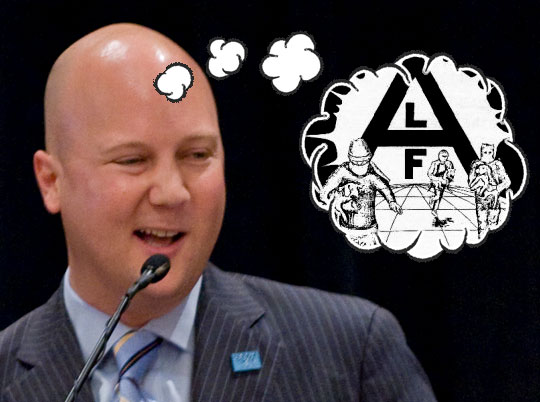Wayback Machine 1, Markarian 0
The Internet, as practically any public figure can tell you, has a very long memory. Maybe a bit too long. Countless IT professionals work overtime to scrub the online world of their boss’s embarrassing photos, off-color comments, and ill-advised moments of candor. It appears that the Humane Society of the United States needs a few more of those talented folks.
Michael Markarian is the Chief Operating Officer of HSUS. He is the President of HSUS’s official lobbying arm, the Humane Society Legislative Fund. He is also the Chairman of HSUS’s “Humane USA” political action committee. Markarian ran the Fund For Animals some years after Wayne Pacelle left to join HSUS, and later assumed HSUS’s second-banana role when Pacelle merged the two groups together.
In 1997, Markarian wrote an editorial for The Abolitionist, a newsletter co-edited by Paul Shapiro (who would later become an HSUS campaign manager). That newsletter was the official publication of a Washington, DC-based animal rights group called Compassion Over Killing (COK), which Shapiro helped to found.
COK no longer offers the earliest—and most radical—issues of The Abolitionist on its website. (In fact, three years ago the group re-branded its newsletter as a warm-and-fuzzy magazine called Compassionate Action.) But thanks to the “Internet Wayback Machine,” they’re still available. And you can read Markarian’s 1997 editorial more than a decade later. (We’ve also uploaded the text to the HumaneWatch Document Library for posterity.)
In his essay, Markarian builds on the writing of social activist pioneer Bill Moyer (not to be confused with Bill Moyers) and divides animal rights activists into four groups, offering his own ideas about “effective” and “ineffective” examples of each.
Along the way, he appears to defend lawbreaking in the name of “animal liberation”:
While the “citizen” activist says “YES” to that which is right, the “rebel” activist says “NO” to that which is wrong. Direct action, civil disobedience, hunt sabotages, and Animal Liberation Front activities all fall under this category. Activists purposely breaking laws that are unjust, such as hunter harassment laws, or committing acts of civil disobedience to help animals, are effective rebels because they tie the movement’s issues together with First Amendment, freedom of speech, and civil liberties issues. A perfect example of effective rebellion is an Animal Liberation Front raid on a laboratory that frees puppies from its confines and exposes video footage of the researchers torturing the animals. Sure, the activists broke the law, but all of their activities focused directly on saving animals and exposing cruelty. (emphasis added)
So it’s okay to break into a medical research lab and destroy someone’s cancer research, if the ends justify the means? The writer, remember, is the Second-In-Command at HSUS, and its chief lobbying officer.
It would be fascinating to ask Markarian if he still believes this today.
For the record, the Animal Liberation Front (ALF)—Markarian’s “perfect example of effective rebellion”—is an FBI-designated terrorist group responsible for tens of millions of dollars in property damage and an increasingly cavalier attitude toward the lives of both people and animals. It’s especially worth noting that when Markarian wrote this essay, the ALF’s known crimes already included multiple arsons.
No wonder “Markarian” triggers a suggestion of “Barbarian” from Microsoft Word’s spell checker.
But seriously, in this light Markarian appears to have been every bit as much of an ALF apologist as the better-known Bruce Friedrich, his counterpart (as second-in-command) at PETA. Less than four years after Markarian’s essay was published, Friedrich famously quipped at a national animal-rights convention: “Of course we're going to be, as a movement, blowing stuff up and smashing windows … Hallelujah to the people who are willing to do it.”
More recently, in a 2004 essay titled “Defending Agitation and the ALF,” Friedrich declared that ALF crimes are “a reasonable response” to a world in which people eat meat. Under the heading “Blow It Up,” he concluded that he might not endorse burning down a building if mice living inside didn’t make it to safety. But …
These reflections do not, of course, rule out burning meat trucks. And they don't mean that when the next slaughterhouse or vivisection lab burns down, I will denounce those who carried out the burning, or that I will feel anything other than joy in my heart. (emphasis added)
When the line blurs between HSUS and PETA like this, it’s a little bit like people confusing Larry King with Larry the Cable Guy. At least one of them probably resents the comparison.
Again, it would be really interesting to learn whether Markarian still believes the most radical and violent elements of his own social movement should be valued and praised, not prosecuted and jailed. The next time he testifies in a Congressional hearing, maybe someone will ask him.




